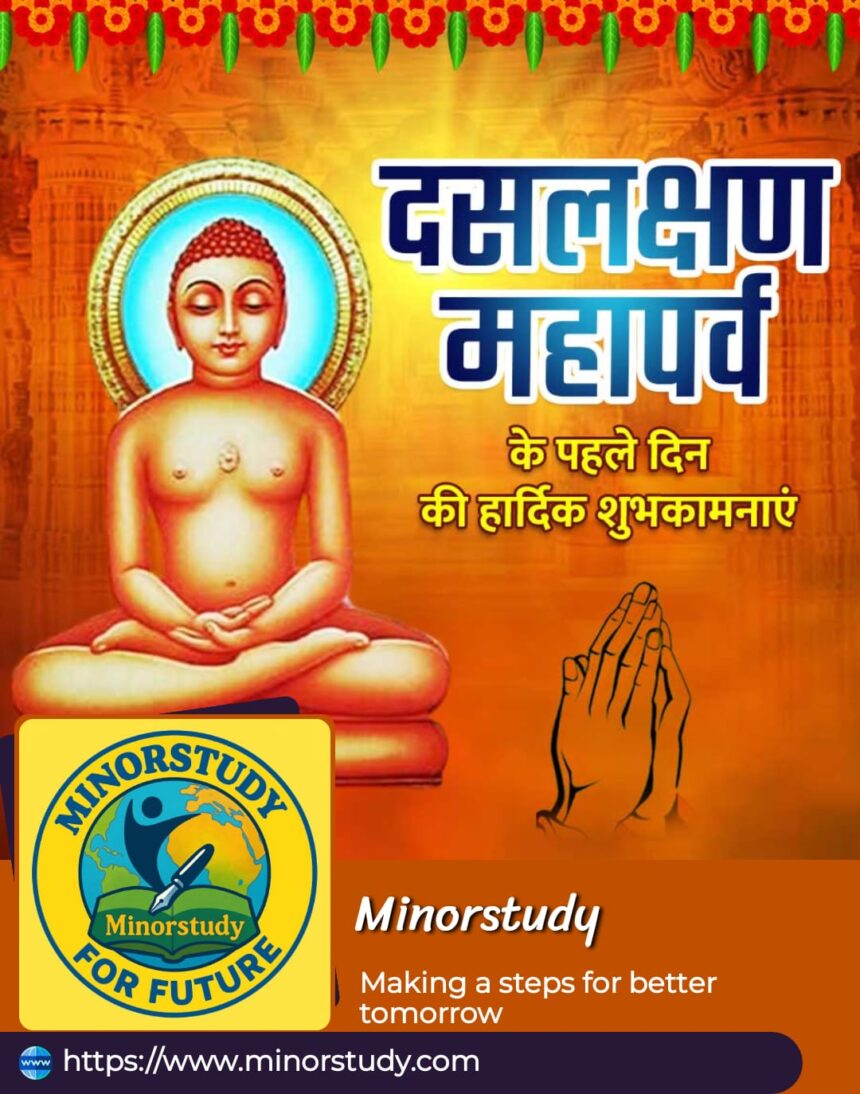Introduction
India is known as the land of festivals, each carrying deep spiritual and cultural significance. Among them, Daslakshana Mahaparva is one of the most sacred Jain festivals, celebrated right after Paryushan Parva. While Paryushan emphasizes repentance, forgiveness, and self-purification, Daslakshana Mahaparva focuses on the ten supreme virtues (dasha lakshanas) that form the foundation of Jain dharma.
- Introduction
- History of Daslakshana Mahaparva
- Timeline of Daslakshana Mahaparva
- Interesting Facts About Daslakshana Mahaparva
- Significance of Daslakshana Mahaparva
- 1. Spiritual Growth
- 2. Moral Discipline
- 3. Peace and Harmony
- 4. Detachment from Materialism
- 5. Universal Relevance
- Observance and Practices
- Daily Life Impacts of Daslakshana Mahaparva
- Importance in Society
- Wishing Messages for Daslakshana Mahaparva
- FAQs About Daslakshana Mahaparva
- Conclusion: Why Daslakshana Mahaparva Matters Today
Observed mainly by the Digambar Jain community, this 10-day festival is not just about religious rituals—it is a spiritual journey of inner transformation, self-discipline, and moral awakening.
In this article, we will explore the history, timeline, facts, significance, daily life impacts, observances, FAQs, wishing messages, and importance in modern society—all in a human-friendly style that connects with everyday life.
History of Daslakshana Mahaparva
The origins of Daslakshana Mahaparva can be traced back to ancient Jain scriptures, where the festival is described as a period of reflection on ten supreme dharmas (virtues).
These virtues guide individuals toward spiritual growth, liberation (moksha), and righteous living.
According to Jain tradition, after Paryushan Parva ends with Kshamavani (Forgiveness Day), the Digambar sect observes Daslakshana Mahaparva, extending the spirit of self-purification through deeper practice of virtues.
This festival serves as a reminder that religion is not just worship but disciplined practice of ethics and values in daily life.
Timeline of Daslakshana Mahaparva
The festival lasts 10 days, with each day dedicated to one of the ten supreme virtues.
Day 1 – Uttam Kshama (Supreme Forgiveness)
Cultivating forgiveness, letting go of anger and grudges.Day 2 – Uttam Mardava (Supreme Humility)
Practicing gentleness, politeness, and respect for all beings.Day 3 – Uttam Arjava (Supreme Straightforwardness)
Honesty in thoughts, words, and deeds.Day 4 – Uttam Shauch (Supreme Contentment/Purity)
Inner and outer purity, satisfaction with what one has.Day 5 – Uttam Satya (Supreme Truthfulness)
Speaking truth that is beneficial and non-harmful.Day 6 – Uttam Sanyam (Supreme Self-restraint)
Controlling desires and practicing discipline.Day 7 – Uttam Tap (Supreme Penance/Austerity)
Practicing fasting, meditation, and tolerance of hardships.Day 8 – Uttam Tyag (Supreme Renunciation)
Giving up ego, attachment, and unnecessary possessions.Day 9 – Uttam Akinchanya (Supreme Non-attachment)
Cultivating detachment from materialistic desires.Day 10 – Uttam Brahmacharya (Supreme Celibacy/Chastity)
Living a life of purity, control, and devotion to higher values.
Interesting Facts About Daslakshana Mahaparva
It is one of the most important Digambar Jain festivals, observed right after Paryushan.
The festival is also called Parva of Ten Virtues.
Many Jains undertake fasts of varying lengths, from a single day to the entire 10-day period.
The last day (Brahmacharya) is considered the highest stage of spiritual purity.
Jain monks and scholars deliver discourses (pravachans) on the meaning of virtues daily.
Jain temples are beautifully decorated, and communities gather for collective prayers.
The festival emphasizes practical application of virtues in daily life rather than rituals alone.
Significance of Daslakshana Mahaparva
1. Spiritual Growth
Each virtue strengthens the soul and brings one closer to liberation (moksha).
2. Moral Discipline
The ten virtues serve as a guidebook for ethical living.
3. Peace and Harmony
By practicing forgiveness, humility, and truth, conflicts are reduced in families and society.
4. Detachment from Materialism
The virtues of renunciation and non-attachment help individuals overcome greed.
5. Universal Relevance
Though rooted in Jainism, the values of honesty, forgiveness, and self-control are universal human values.
Observance and Practices
Fasting (Upvas): Many Jains observe fasts during these 10 days for purification.
Swadhyaya (Scripture Study): Reading Jain texts related to each virtue.
Pravachans (Discourses): Listening to monks and scholars explain the virtues.
Puja and Temple Visits: Daily worship in temples.
Charity and Service: Donating food, clothes, or helping the needy.
Forgiveness: Seeking and granting forgiveness to strengthen relationships.
Daily Life Impacts of Daslakshana Mahaparva
Practicing forgiveness reduces stress and brings inner peace.
Humility helps avoid ego clashes in personal and professional life.
Truthfulness builds trust in relationships.
Self-restraint helps control harmful habits.
Renunciation and non-attachment teach us to live simply and focus on meaningful goals.
Penance and fasting improve discipline, health, and spiritual awareness.
The festival inspires a balanced lifestyle of compassion, honesty, and mindfulness.
Importance in Society
Promotes non-violence, truth, and moral living, which are needed in today’s fast-paced world.
Encourages peaceful conflict resolution through forgiveness and humility.
Inspires ethical business practices, honesty, and fairness.
Builds community unity as families and groups participate collectively.
Strengthens the cultural and spiritual identity of Jain society.
Wishing Messages for Daslakshana Mahaparva
🌸 “May the ten virtues of Daslakshana Mahaparva guide your life towards peace, purity, and prosperity.”
🌸 “On this sacred occasion of Daslakshana, let us embrace forgiveness, truth, and humility in our lives.”
🌸 “Wishing you and your family a blessed Daslakshana Mahaparva filled with spiritual growth and happiness.”
FAQs About Daslakshana Mahaparva
Q1. What is Daslakshana Mahaparva?
A1. It is a 10-day Jain festival celebrated by the Digambar community, focusing on the ten supreme virtues of Jainism.
Q2. When is Daslakshana celebrated?
A2. It begins right after Paryushan Parva and lasts for 10 days.
Q3. What are the ten virtues?
A3. Forgiveness, Humility, Straightforwardness, Contentment, Truthfulness, Self-restraint, Penance, Renunciation, Non-attachment, and Celibacy.
Q4. Do all Jains celebrate this festival?
A4. It is mainly celebrated by Digambar Jains, while Shwetambar Jains primarily focus on Paryushan.
Q5. How do devotees observe it?
A5. Through fasting, prayers, scripture study, discourses, and practicing virtues in daily life.
Conclusion: Why Daslakshana Mahaparva Matters Today
In today’s world, where stress, conflicts, and materialism dominate, the teachings of Daslakshana Mahaparva are more relevant than ever. These ten virtues are not just religious ideals but practical life lessons—forgiveness heals, humility strengthens relationships, truth builds trust, and self-restraint ensures balance.
This festival reminds us that real happiness does not come from possessions but from purity of soul and right conduct. By adopting even a few of these virtues, individuals can transform their lives and contribute to a more peaceful society.
Thus, Daslakshana Mahaparva is not just a Jain festival—it is a universal call to live with values, discipline, and compassion.









It’s arduous to search out educated people on this matter, but you sound like you realize what you’re speaking about! Thanks